|
Associate Editor for Meat  Edi Piasentier is Professor of Animal Husbandry in the Department of Agricultural, Food, Environmental and Animal Sciences at the University of Udine. Piasentier serves as director of the University’s Experimental Farm ‘A. Servadei’ and he is the coordinator of the ‘Livestock Farming and Food Quality’ research group at the University of Udine, where he is also course convenor in the graduate and postgraduate programs of Animal Sciences. He is a member of the scientific committee of the doctorate programme in Agricultural Sciences and Biotechnologies, and he has been the first supervisor for 12 Ph.D. students in different aspects of meat quality research, from molecular processes to consumer perception. He is the author of more than 320 publications; his articles have appeared in journals such as Meat Science, Animal Science, Food Chemistry and Food Quality and Preference. His research interests mainly focus on evaluation and modification of the perceived quality of and traceability of animal-source foods. He has applied his expertise in sensory analysis and stable isotope ratio analysis in the study of products from several livestock species, including small ruminants. He has collaborated with research groups in Europe, US, Asia, and Africa. He is a founding member of the Italian Society of Sensory Science.
0 Comments
Associate Editor for Health and Welfare 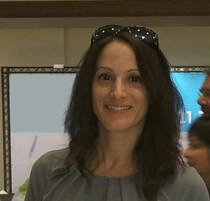 Nurit Argov-Argaman graduated in Animal Science from the Faculty of Agriculture of the Hebrew University of Jerusalem, Israel. After a postdoc fellowship in the Food Science and Technology department at UC Davis, she joined as a faculty in the Animal Science Department of the Hebrew University of Jerusalem, specializing in lactation physiology and metabolism. Dr. Argov-Argaman is actively engaged and leading research on the metabolic and molecular pathways regulating milk composition, with a special interest in milk lipids, including but not limited to fatty acids, polar lipids and glycol-conjugates. Her group conducts in vivo studies on various mammalian species, including bovine, caprine, ovine, mice and human to understand how to elevate the content of bioactive molecules in milk. The underlying molecular, biochemical and metabolic regulation of milk composition is studied in in vitro system of mammary epithelial cells, employing metabolic, biochemical and biophysical approaches. Her group is also leading the development of a sustainable approach to induce production and improve milk quality by studying the interaction between genetic background and diet of dairy farm animals. Of special focus is the dietary source of plant secondary metabolites which may help to maintain productivity under stressful conditions such as energy balance, heat stress, and water shortage. Associate Editor for Health and Welfare  Dr. M.S.A. Kumar earned his veterinary degree (BVSc) and subsequently a master’s degree (MVSc) in anatomy with University Gold Medals from the Mysore Veterinary College, in Bangalore, India. He was a dairy cattle veterinarian for three years and went to Nigeria to teach veterinary anatomy at the Ahmadu Bello University for two years and also served as an external examiner for anatomy at the University of Nigeria. He joined Kansas State University to earn an MS degree in veterinary physiology and a Ph.D. degree from the University of Florida in neuroendocrinology. He taught anatomy and surgical anatomy as well as renal physiology at the University of Florida and moved to Boston to join the Veterinary College associated with Tufts University. He has been teaching and directing the veterinary anatomy program at Tufts University for three-plus decades, and maintained an active lab conducting research on neurochemistry. Dr. Kumar published extensively in the field of neuroscience and also published two textbooks on canine anatomy (Linus Learning Publishers, NY). He is currently a professor of anatomy in the department of medical education, Tufts University School of Medicine, Boston.  Cattle, pigs, sheep and goats Introduction In 1998 the Swedish Veterinary Association decided to adopt a general policy for the use of antibiotics in animals. Since then specific policies for the use of antibiotics in dogs and cats have been adopted and in 2011 Guidelines for the use of Antibiotics in Production animals – Cattle and Pigs, were accepted. By decision of the board of the Swedish Veterinary Society (SVS) these guidelines have been updated. The over-arching goal of SVS is to achieve a low and controlled use of antibiotics in Swedish animal production so that the first-hand choices of treatment remain efficient and that the spread of antimicrobial resistance – among animals and herds as well as in the food chain – is kept at a minimum. Keeping antimicrobial resistance in animals low is important also for human health, since we are all part of the same ecosystem. The authors of these guidelines hope that they may be useful for veterinarians in clinical practice when deciding on treatments for common diseases and ailments caused by bacteria. Sometimes the decision may even be to refrain from use of antibiotics and chose other ways of improving herd health. To read more of the introduction, download a copy here. Diseases in goats Ylva Persson, DVM, PhD Introduction In Sweden only one antimicrobial is registered for use in goats – benzyl penicillin procaine (BPP) (Penovet®, Boehringer Ingelheim Vetmedica, FASS VET. Sweden 2015). All other drugs for therapy need to conform to the EU cascade principle. Since goats might react with strong pain to injections with tetracycline other antimicrobials should be preferred if BPP cannot be expected to be effective. Mastitis Mastitis is the most important production disease in goat milk herds. Good udder health is important for animal welfare as well as from food safety aspects. The most frequently isolated udder pathogens in dairy goats in Sweden are Staphylo coccus (S.) aureus and coagulase negative staphylococci (CNS). Subclinical mastitis is seen more often than clinical. 7th International Conference on Sustainable Animal Agriculture for Developing Countries (SAADC 2019)2/19/2019 “Eco-friendly Animal Production for Profitable Smallholder Farming"  November 8-11, 2019 Hotel Pokhara Grade, Pokhara, Nepal Website: www.saadc2019.org Key dates: Deadline for Article Mentoring: May 1, 2019 Deadline for Paper Submission: July 15, 2019 Early bird registration: July 31, 2019 Target participants: Stakeholders in animal agriculture production including scientists, researchers, veterinarians, policy makers, farmers and entrepreneurs.  Associate Editor for Reproduction Prof. K.C. Lehloenya is Associate Professor in the Department of Agriculture, University of Zululand, KwaZulu-Natal province, South Africa. She teaches various physiology and animal science subjects. To date, she supervised 16 postgraduate students to completion in reproduction and production physiology. Her specialization is in reproductive physiology and utilization of assisted reproduction technologies in farm animals to speed up the genetic progress and conservation of valuable genetic material. She is currently focused on combining specific nutrients (antioxidants) and molecular biology to improve livestock production using assisted reproductive technologies such as estrous synchronization, artificial insemination, in vitro embryo production and gametes cryopreservation. She visited and collaborated with international researchers from University of Florida (USA), INIA (Spanish National Institute for Agricultural and Food Research and Technology, Spain), AGRIS (Agricultural Research Agency of Sardinia, Italy). She authored and co-authored numerous papers on in vitro fertilization, estrous synchronization, multiple ovulation and embryo transfer, semen quality and cryopreservation.  Associate Editor for Nutrition Dr. Sylvie Giger-Reverdin is working as a senior scientist for the French Research Institute in Agriculture Science (INRA), in the INRA-AgroParisTech Research Unit MoSAR (Systemic Modelling Applied to Ruminants), Paris, France. She graduated in Agricultural Science from the Institut National Agronomique Paris-Grignon (France), with specialization in Sciences and Engineering in Animal Science, Nutrition option and received a Master of Science in Nutrition and Feeding of domestic animals from the Paris VI University (France) in 1977. She obtained a Ph.D. in Agricultural Science from the Institut National Agronomique Paris-Grignon (France), with her dissertation titled “Influence of the composition of the concentrate on the nutritive value of diets fed to dairy ruminants.” Her main field of research concerns the nutrition and feeding of ruminants bred in intensive conditions, especially dairy goats, used as a model for dairy cattle. She has been especially involved in research on the nutritive value of concentrates, on the nutritive requirements of goats and on ruminal metabolism. For a couple of years, she has focussed on the effects of feeding behavior, and especially on the relationships between acidosis, feeding behavior and animal welfare in dairy goats. Dr. Sylvie Giger-Reverdin is an IGA member. 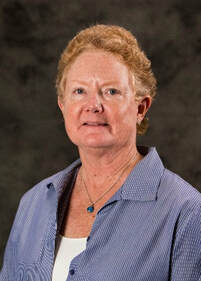 Associate Editor for Reproduction Nancy H. Ing, D.V.M., Ph.D. is a professor in the Department of Animal Science at Texas A&M University in the U.S.A. Texas A&M University is located in central Texas and has 68,000 students and is the 4th ranked veterinary college in the country (out of 30). Prairie View A&M University, 40 miles to the south, is home to the International Goat Research Center. Current research interests are:
The importance of the first area is that the RNAs may provide a novel assay relating to fertility and the non-coding RNAs are likely to regulate gene expression in the early embryo. The importance of the second area is that stress is increasing for animals and glucocorticoids, whether endogenous or given for medical reasons, rapidly but transiently impair steroidogenesis, resulting in periods of subfertility. For these studies, she has used goats, stallions and, most recently, honey bees and cattle. Previously, her research focused on estradiol’s stabilization of estrogen receptor alpha mRNA in the sheep uterus. She’s published 52 peer-reviewed research papers, nine book chapters, and 51 abstracts. 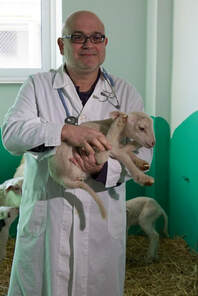 Editor for Special Issues George C. Fthenakis, DVM (Thessaloniki), MSc (London), Ph.D. (London), Dip.ECAR, Dip.ECSRHM, is Professor and the Dean at the Veterinary Faculty of the University of Thessaly, Greece. He was the Foundation President of the European College of Small Ruminant Health Management (2008-11) and serves a fourth term as President of the Farm Animal Hellenic Veterinary Medical Society (2009-21). He has supervised eight Ph.D. theses and one European Veterinary College specialization program. Currently, he supervises four Ph.D. students and two European Veterinary College residents. He has managed 29 research grants, funded by the public or the private sector, among them the large ‘Goshomics’ project (budget: 1,788,500 €, 10 partners). He has published 182 refereed papers (cumulative impact factor: 243.5), which have received >2000 citations. He has authored or edited four books. He has published >480 abstracts in conference proceedings and has made 73 invited/keynote presentations. He was the organizer of the 6th International Sheep Veterinary Congress (2005), the 1st European Conference in Small Ruminant Health Management (2011) and the 11th (2009) and 13th (2015) Greek National Veterinary Congresses. He has participated in many national or international committees, including the European Board for Veterinary Specialisation, the General Assembly of the Federation of Veterinarians in Europe and the committee for ‘Welfare of sheep’ of the European Food Safety Authority. He has received an Honorary scroll from the Hellenic Veterinary Medical Society (2005), the ‘Allan Baldry’ award from the British Sheep Veterinary Society (2006), a Meritorious award from the Karditsa Society for Animal Welfare (2008) and the ‘Konstantinos Tarlatzis’ prize of the Hellenic Veterinary Medical Society (2009). He was elected a Fellow of the Greek Agricultural Academy in 2010. He has received three Awards of Academic Scientific Excellence in ‘Veterinary Medicine and Science’ by the Greek Ministry of Education (2012, 2013, 2014), a Prize for excellent academic and scientific achievements by the Hellenic Veterinary Association (2013). George also received an Award of Clinical Excellence by the European College of Small Ruminant Health Management (2014), a Prize for the excellent and sustained support of the veterinary profession in Greece by the Hellenic Veterinary Association (2015) and a meritorious award by the organizing committee of the 9th International Sheep Veterinary Congress for the significant contributions at the conference (2017). George is a former IGA member and former Country Representative for Greece. 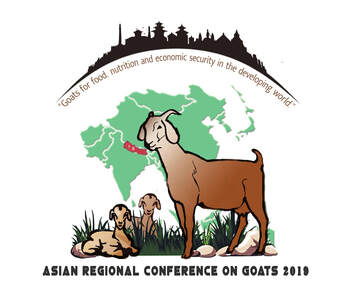 Faculty of Animal Science, Veterinary Science and Fisheries, Agriculture and Forestry University, Chitwan, Nepal in collaboration with the International Goat Association (IGA) is organizing the second Asian Regional Conference on Goats (ARCG 2019). The theme of the conference is ‘goats for food, nutrition and economic security in developing world.’ The conference will be held on 20-23 October 2019 in Chitwan, Nepal in support of Ministry of Agriculture and Livestock Development, Department of Livestock Services; Nepal Agricultural Research Council; Heifer International Nepal and University Grants Commission. The main aim of the conference is to gather researchers, academicians and development entities to exchange knowledge and technologies generated in the field of goat research and development across the globe. Thus, the organizing committee of ARCG 2019 hereby announces this CALL FOR ABSTRACT for the same. Thematic areas
|
IGA Blog
The International Goat Association promotes goat research and development for the benefit of humankind, to alleviate poverty, to promote prosperity and to improve the quality of life. Archives
May 2024
Categories
All
|
|
International Goat Association
2516 Millbrook Rd., Little Rock, AR72227 USA email: [email protected] -454-1641 |
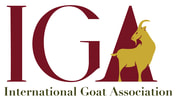
 RSS Feed
RSS Feed